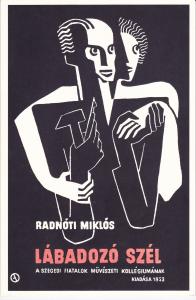
Convalescent Wind
Lábadozó szél (Convalescent Wind) (1933)
Written by Miklós Radnóti
Introductory study by Attila Buda
National Széchényi Library – Kossuth Publishing House, 2019, 64 pages
ISBN 978 963 099 606 8
This is a facsimile edition of the third volume of Radnóti's work, published in 1933, when he was still at the beginning of his career. The cover of the book of poems, consisting of four cycles and a longer closing poem, was designed by György Dóczi. The expressive style of the black-and-white linocut is in perfect harmony with one of the linguistic registers of the poems. The material of the second and third cycles of the volume is taken from the volume Újmódi pásztorok éneke (Songs of Modern Shepherds), which was confiscated in April 1931, and the other fifteen poems were published for the first time in this collection.
"In recent years, the College of Young Artists of Szeged has been doing remarkable work, publishing books one after another, the value of which is very outstanding in the Hungarian and even European context. Miklós Radnóti's book of poems occupies a worthy place among these books, and the poet, who is definitely a new voice, is testimony to the fact that the insight of the new youth can rise above the lies of everyday life and grasp life at its roots, which still wants to live. Radnóti's poems are very strange and fresh free verse, rolling forward with an inner rhythm like a fast train roaring through the Great Hungarian Plain. His words are sledgehammers, his images grow out of the ground like a blossom of bread-bearing wheat, fresh and alive and free of all romanticism. Somehow, we sense a new Berzsenyi growing out of Radnóti's poems, the deep roll of the quaking earth and the mountain-shaking movement of tense forces. In his new volume, Radnóti comes to us as a mature poet, joining the ranks, simply and naturally, like a soldier who knows that great tasks await him and that he will take on and carry out these great tasks." (Zoltán Csuka)
Shopping
Our publications are available in our bookshop, or can be ordered from the Publications Department of the NSZL using the contact details below: Főigazgatói Kabinet kiadványtára, Országos Széchényi Könyvtár, 1276 Budapest P.O. box 1205., phone: 06-1-23-23-506, e-mail: kiadvanytar@oszk.hu.




